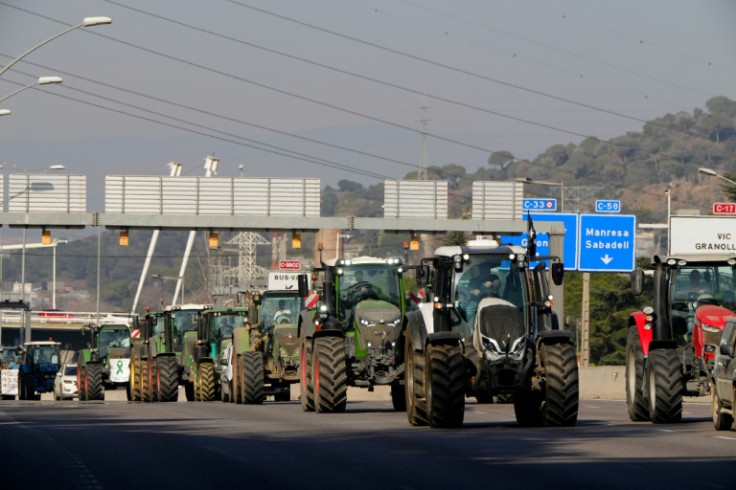Spanish Farmers Block Roads For Second Day
Thousands of farmers used tractors to block roads across Spain for the second day running on Wednesday amid Europe-wide protests against cheaper imports and heavy regulation.

Thousands of farmers used tractors to block roads across Spain for the second day running on Wednesday amid Europe-wide protests against cheaper imports and heavy regulation.
Farmers gathered at dawn on dozens of roads, snarling traffic, mainly in Andalusia in the south, the northeastern region of Catalonia and Navarra in the north, according to the Spanish General Directorate for Road Traffic.
Almost 1,000 tractors drove slowly to the centre of Spain's second city Barcelona, the capital of Catalonia, where they rallied in front of the headquarters of the regional government.
"Bureaucracy is suffocating us... you need to think more about documents and paperwork demanded by the administration than work on the ground," 45-year-old protester Joan Maia Sala told AFP.
After meeting regional president Pere Aragones, some farmers said they intended to sleep on site and were determined to continue demonstrating.
Tractors were also used to block roads leading to the southern port of Malaga in Andalusia and the eastern port of Castellon, authorities said.
There were some tense moments between demonstrators and police, particularly in the southern city of Granada. The interior ministry reported 12 arrests across the country.
Spain's CETM goods transport association urged the authorities to take steps to prevent the sector from being held "hostage to the protests".
"We understand" farmers, but "the big victims" were transport companies, it added in a statement.
Another transport sector federation, Fenadismer, said 80,000 lorries were affected by the blockades and estimated the financial impact at 120 million euros ($129 million).
Spain's three main agricultural unions, Asaja, Coag and UPA, did not initiate the demonstrations which began on Tuesday. They have planned other protests this week, including Thursday in Salamanca in the northwest and Friday in the northern city of Bilbao.
"These are problems which we have long raised without getting any answers," UPA secretary general Marcos Alarcon said during an interview with Spanish public radio.
The three unions -- who say the CAP is too complex and allows unfair foreign competition -- held emergency talks on Friday with Agriculture Minister Luis Planas, who agreed to work on a response.
Prime Minister Pedro Sanchez told parliament on Wednesday that he was "on the side of the farmers" and highlighted measures his government has adopted in recent years to support the sector, especially in the face of a long drought.
He vowed to simplify rules for the implementation of the CAP, and to improve laws aimed at preventing farmers from selling products at a loss.
Spain is one of Europe's leading producers of fruit and vegetables.
But its agricultural sector faces difficulties, largely due to a lack of rainfall that has plagued the Iberian Peninsula for the last three years.
© Copyright AFP 2025. All rights reserved.




















